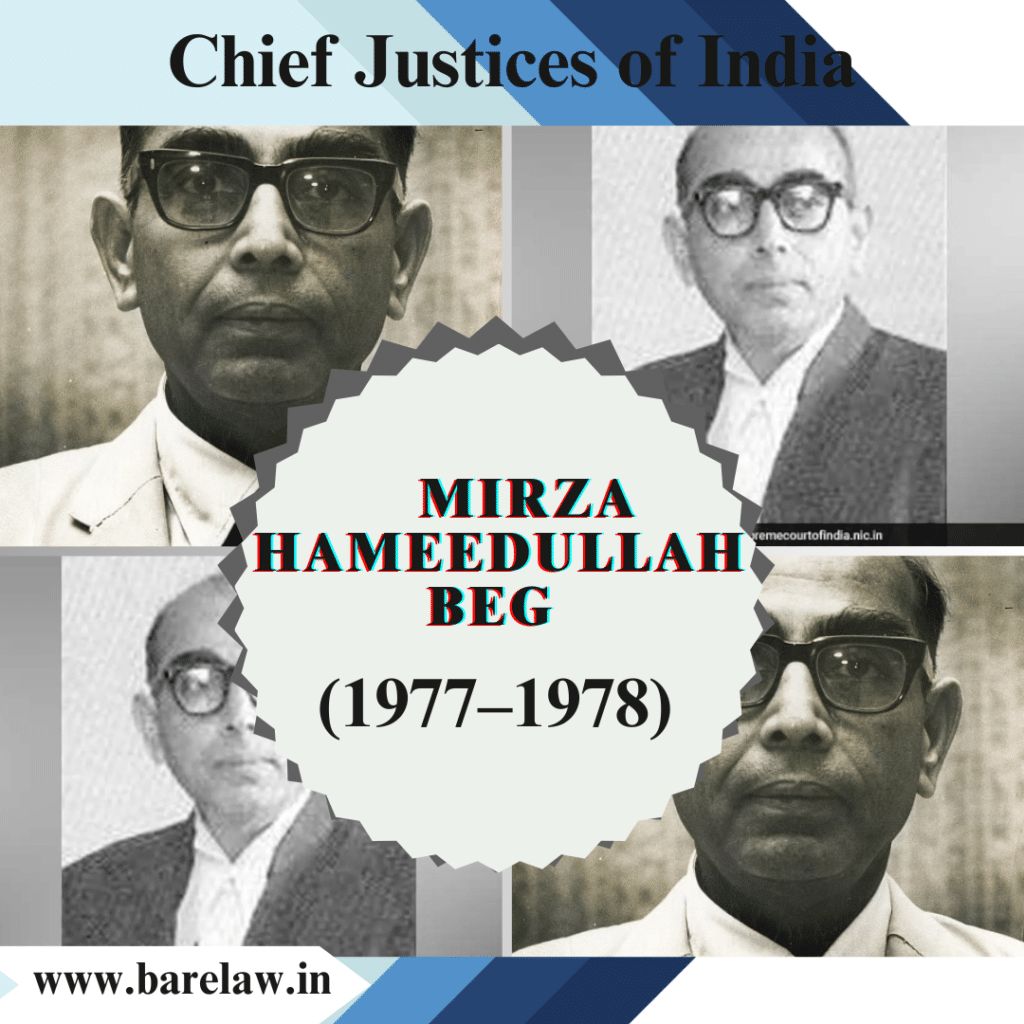
Table of Contents
Mirza Hameedullah Beg: The Influential Tenure as Chief Justice of India (1977-1978)
Mirza Hameedullah Beg: The Influential Tenure as Chief Justice of India (1977-1978)
Introduction
The role of the Chief Justice of India has always been pivotal in shaping the country’s legal landscape. In the annals of India’s judicial history, one name stands out prominently – Mirza Hameedullah Beg. Serving as the Chief Justice of India from 1977 to 1978, his tenure left an indelible mark on the nation’s jurisprudence. In this article, we delve into the significant contributions and landmark judgments that defined his influential tenure.
Early Life and Career
Mirza Hameedullah Beg was born on February 12, 1907, in the city of Allahabad. His early education took place at the University of Allahabad, where he honed his legal acumen. After completing his legal studies, he embarked on a distinguished career that eventually led him to the highest judicial office in the country.
Beg’s rise through the judicial ranks was marked by his deep commitment to the principles of justice and the rule of law. His reputation as a legal scholar and a jurist of great integrity made him a natural choice for the position of Chief Justice of India.
Landmark Judgments
- Kesavananda Bharati vs. State of Kerala (1973): One of the most significant cases during Beg’s tenure was the Kesavananda Bharati case. The judgment in this case, which upheld the basic structure doctrine, laid the foundation for the protection of India’s democratic and constitutional values. Beg’s role as a member of the bench that delivered this historic verdict cannot be overstated. It established that certain features of the Constitution, such as democracy, secularism, and the separation of powers, could not be amended by the Parliament, thus safeguarding the essence of the Indian Constitution.
- ADM Jabalpur vs. Shiv Kant Shukla (1976): Another critical case during Beg’s tenure was the infamous ADM Jabalpur case. This case posed a fundamental question about the scope of individual liberties during times of emergency. The majority judgment, which upheld the suspension of fundamental rights during the Emergency, was a contentious one. Chief Justice Beg, however, dissented, emphasizing the importance of protecting individual rights even in extraordinary circumstances. His dissenting opinion remains a testament to his unwavering commitment to constitutional principles.
Legacy of Legal Reform
Chief Justice Beg’s tenure was marked by a commitment to legal reform and social justice. He recognized the judiciary’s role in addressing societal issues and sought to make the legal system more accessible to all. His efforts included initiatives to reduce the backlog of cases, streamline judicial procedures, and improve access to justice for marginalized communities.
Beg’s emphasis on judicial activism to protect the rights of citizens left an enduring legacy. He believed that the judiciary had a vital role in safeguarding the principles of justice, liberty, and equality enshrined in the Constitution. His tenure saw the Supreme Court of India emerge as a guardian of these principles, providing recourse to those who sought justice.
Constitutional Jurisprudence
As Chief Justice, Beg was known for his deep understanding of constitutional jurisprudence. He authored several important judgments that contributed to the development of constitutional law in India. His decisions were characterized by a nuanced and principled approach, reflecting a profound respect for the Constitution and its values.
Beg’s commitment to constitutionalism was evident in his rulings on matters related to fundamental rights, federalism, and the separation of powers. His judgments emphasized the need for a harmonious interpretation of the Constitution, which balanced the powers of different branches of government while upholding the rights of citizens.
Conclusion
Mirza Hameedullah Beg’s tenure as the Chief Justice of India from 1977 to 1978 was a period of profound significance for the country’s legal landscape. His legacy is marked by landmark judgments, a commitment to legal reform, and a deep understanding of constitutional jurisprudence. Chief Justice Beg’s contributions continue to shape India’s legal system and serve as a testament to the enduring importance of the judiciary in upholding the rule of law and protecting the rights of citizens. His name will forever be etched in the annals of Indian judicial history as a true champion of justice and constitutional values.





